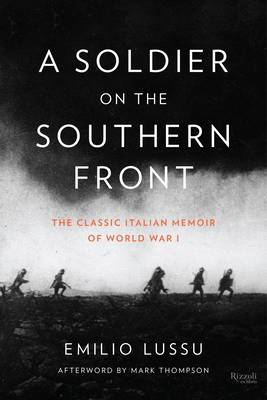
- Afhalen na 1 uur in een winkel met voorraad
- Gratis thuislevering in België vanaf € 30
- Ruim aanbod met 7 miljoen producten
- Afhalen na 1 uur in een winkel met voorraad
- Gratis thuislevering in België vanaf € 30
- Ruim aanbod met 7 miljoen producten
Zoeken
A Soldier on the Southern Front
The Classic Italian Memoir of World War 1
Emilio Lussu
Hardcover | Engels
€ 23,95
+ 47 punten
Omschrijving
A rediscovered Italian masterpiece chronicling the author's experience as an infantryman, newly translated and reissued to commemorate the centennial of World War I. Taking its place alongside works by Ernst JYnger, Robert Graves, and Erich Maria Remarque, Emilio Lussu's memoir is one of the most affecting accounts to come out of the First World War. A classic in Italy but virtually unknown in the English-speaking world, it reveals, in spare and detached prose, the almost farcical side of the war as seen by a Sardinian officer fighting the Austrian army on the Asiago plateau in northeastern Italy, the alpine front so poignantly evoked by Ernest Hemingway in A Farewell to Arms.
For Lussu, June 1916 to July 1917 was a year of continuous assaults on impregnable trenches, absurd missions concocted by commanders full of patriotic rhetoric and vanity but lacking in tactical skill, and episodes often tragic and sometimes grotesque, where the incompetence of his own side was as dangerous as the attacks waged by the enemy. A rare firsthand account of the Italian front, Lussu's memoir succeeds in staging a fierce indictment of the futility of war in a dry, often ironic style that sets his tale wholly apart from the Western Front of Remarque and adds an astonishingly modern voice to the literature of the Great War.
For Lussu, June 1916 to July 1917 was a year of continuous assaults on impregnable trenches, absurd missions concocted by commanders full of patriotic rhetoric and vanity but lacking in tactical skill, and episodes often tragic and sometimes grotesque, where the incompetence of his own side was as dangerous as the attacks waged by the enemy. A rare firsthand account of the Italian front, Lussu's memoir succeeds in staging a fierce indictment of the futility of war in a dry, often ironic style that sets his tale wholly apart from the Western Front of Remarque and adds an astonishingly modern voice to the literature of the Great War.
Specificaties
Betrokkenen
- Auteur(s):
- Vertaler(s):
- Uitgeverij:
Inhoud
- Aantal bladzijden:
- 278
- Taal:
- Engels
Eigenschappen
- Productcode (EAN):
- 9780847842780
- Verschijningsdatum:
- 25/02/2014
- Uitvoering:
- Hardcover
- Formaat:
- Genaaid
- Afmetingen:
- 150 mm x 213 mm
- Gewicht:
- 498 g

Alleen bij Standaard Boekhandel
+ 47 punten op je klantenkaart van Standaard Boekhandel
Beoordelingen
We publiceren alleen reviews die voldoen aan de voorwaarden voor reviews. Bekijk onze voorwaarden voor reviews.







